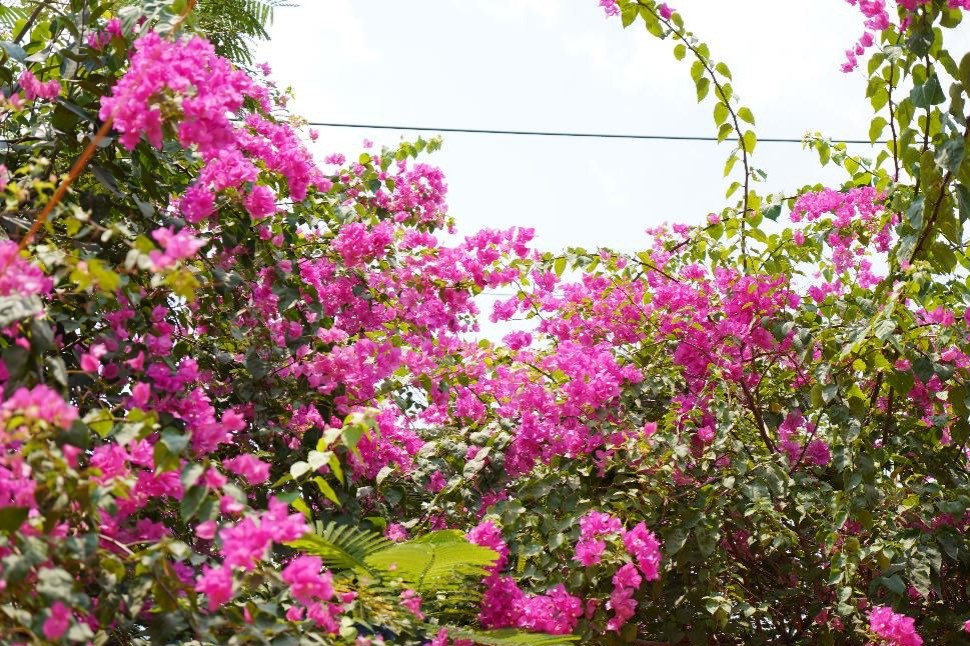Phuong Hoa, Communications Officer, EpiC Vietnam
Rachel Coley, Technical Advisor and Project Manager, EpiC Vietnam
In a small district in Southern Vietnam lies a charming house where magenta bougainvillea flowers spill across the gate to the home of Hong An (pseudonym). From this garden, Hong An has spent the last two years helping peers from across the region understand available HIV services and access them for free through the enhanced peer outreach approach (EPOA). Funded by the U.S. President’s Emergency Plan for AIDS Relief (PEPFAR) and the U.S. Agency for International Development (USAID), the Meeting Targets and Maintaining Epidemic Control (EpiC) project in Vietnam uses EPOA to complement traditional community-led outreach workers’ efforts. Clinic staff encourage outreach workers and clients on antiretroviral therapy (ART) and pre-exposure prophylaxis (PrEP), known as peer mobilizers or seeds, to refer others in their social networks—including partners, friends, and family members—for HIV testing.
Hong An began taking PrEP to prevent HIV infection. His partner was already using daily PrEP and told him it was safe and effective. When he enrolled, a clinician at the local health facility introduced him to EPOA and told him about how he could help others in need of PrEP or ART. The clinician gave him tips for talking to others about HIV services and helped him develop a visual diagram of his social network to identify people who might be at risk. Hong An placed himself in the center of this diagram (Figure 1) and then placed individuals from his close network who he knew may be at risk on the circle closet to himself. On a second circle, he places individuals outside of his close network whom he had heard may be at risk and who might be willing to talk to him about HIV services. Hong An used this diagram to guide his outreach. The exercise of filling out a diagram helps mobilizers like Hong An consider all potential people in their networks and identify individuals they may not have thought of initially.

Hong An was an especially effective seed due to his ability to actively listen to peers’ stories and concerns with respect and empathy, gain their trust, and offer advice and resources. EpiC’s community outreach partner, Blue Sky Social Enterprise, asked Hong An if he would like to become a formal outreach worker and he jumped at the chance. He joined trainings funded by EpiC Vietnam on HIV testing, motivational counselling, partner tracking, and other relevant topics.
Equipped with new knowledge on HIV, Hong An became passionate about spreading awareness of HIV to others. He gradually grew more confident and outgoing through his outreach work. “I see more and more people who put their faith in me. I enjoy building relationship and feel very happy with myself for being able to help more people,” said Hong An. He can now start conversations with completely new clients in a way that fosters trust and makes them comfortable discussing sensitive topics. He also carefully reassures clients who have reactive HIV screening test results and accompanies them to the clinic for confirmatory testing and registration.
“When I first used PrEP, I was simply thinking that it would help protect me and the people around me [from HIV]. [After being a part of EPOA], I understand HIV services better,” Hong An shared, “I have always wanted to give people knowledge, information, so that they understand how to protect themselves . . . [EPOA] gave me motivation to support people.” Through EPOA, he was able to help dozens of people to start PrEP or HIV treatment.
Hong An is just one of about 630 peer mobilizers that have referred their friends and family to HIV services via EPOA. This approach has been extremely successful in attracting new clients to access HIV services. Peer mobilizers receive small non-cash vouchers for local supermarkets or other local businesses in exchange for referring individuals to services. Vouchers are given for each referred individual who tests and begins on either PrEP or ART. These vouchers are identical for successful HIV or ART referrals to ensure that the HIV status of referred individuals remains private. Since the program launched in June 2021, EPOA has helped more than 63 people access ART and 1,300 people access PrEP in four provinces.
The success of EPOA has led EpiC, USAID, and the Government of Vietnam to consider how the government might take over managing the program by funding non-cash vouchers or other incentives through community-based organizations. In addition, EpiC is also exploring other incentives that work within existing government mechanisms, including awards or vouchers for government services.
Featured image: Bougainvillea at the gate of Hong An’s house (Photo credit: EpiC Vietnam).

